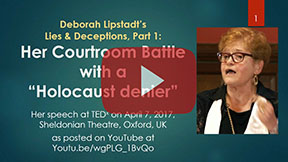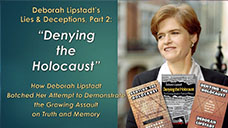For years the U.S. State Department has been claiming in its worldwide review of human rights that there are no reports of political prisoners in Germany. Well, off the top of my head here are a few individuals I know personally, all of them political prisoners of Germany at some point since the early 1990s, sentenced to prison terms for their peacefully expressed political or historical views: Fredrick Toben, Udo Walendy, Hans Schmidt, Fred Leuchter, Günter Deckert, Hans-Jürgen Witzsch, Ernst-Günther Kögel, Erhard Kemper. Just google those names and learn about their fates.
So what is wrong with the U.S. government that it does not see the obvious? A look into my own case may enlighten the reader to the effect that the U.S. seems to have become a part of the persecutorial system which I oppose. Or maybe it has always been a part of it.
Since 1993 the German government has been trying to force me to believe in the officially ordained version of the one chapter of German history called “the Holocaust.” They have done that with all measures of persecution by prosecution. To find relief from this government harassment, I applied for political asylum in the United States in late 2000. Before my case was heard by a U.S. Federal Court in 2006, though, I was deported back to Germany in late 2005, which rendered my application moot. This confirms the impression that the U.S. has fought two world wars in order to get Germany to do what it does now: slowly destroy itself by subverting its self-confidence. So in the long run the U.S. has one capable competitor less in the world. It surely pays for them…
Below is a discussion of the decisions rendered by various US authorities about my application for political asylum. Summarizing it, it may be said that the U.S. recognizes political refugees only, if they are either persecuted by enemy states or if the refugee belongs to a group of victims, the protection of whom is considered “politically correct.”
Fundamentally Flawed: The Definition of Persecution
The United States grant political asylum to those who can prove that they have suffered “past persecution” or have “a well-founded fear of future persecution” “on account of race, religion, nationality, membership in a particular social group, or political opinion” (p. 6 of the decision in Rudolf’s case; all subsequent page numbers from there). So where does a scientist who is persecuted for his scientific views fit in? The answer is: nowhere. That had simply been forgotten when compiling the list of reasons for which one can be persecuted. Bad luck, scientists, you are fair game!
Hence, right from the start of Rudolf’s asylum application, he faced the uphill battle of having to prove somehow that he had been prosecuted for political views incorrectly imputed on him, or that the law he had been prosecuted under in the past and was fearing prosecution in the future has as its primary goal the suppression of certain political or politically interpreted views.
Frivolity isn’t what you think it is
At the beginning of asylum procedures in the U.S., every case is assessed on a mere administrative level. These administrative “courts” are not independent, but receive their orders from the government. Because the U.S. State Department does not recognize Germany as a persecuting country, and because the INS cannot overrule State Department policies, it had to turn down Rudolf’s application. Even though this negative decision was expected, when turning down Rudolf’s application for political asylum, the INS also decided – and the INS Board of Appeals agreed – that Rudolf’s application for political asylum was “frivolous,” which is legalese for fraudulent or deceitful. As a result of this, if this ruling had been fully confirmed by a Federal Court, the INS could have banned Rudolf from the USA for a lifetime, meaning that he wouldn’t have been able to ever return to the U.S.; and that there would be no remedy to change this, meaning that not even his marriage to a U.S. citizen and having a child with her could have averted that lifelong ban.
This decision was brought to a Federal Court for appeal. The reasons for this appeal were, among other things, focused on the charges of “frivolity”:
- The harshest accusation the INS can make against an asylum seeker is that he filed a frivolous application. The harshest penalty the INS can hand down on an immigrant is involuntary departure (that is: deportation in hand cuffs), banning for a lifetime, and no remedy. In other words: under immigration law Rudolf was accused of the most severe crime he could possibly commit, and he was punished with the hardest penalty possible. The problems with this decision are the following:
- A frivolous application is defined by case law as an application either not back-up with any evidence for persecution or by committing treacherous acts against the INS during the asylum proceedings, like lying to the INS judge, forging evidence, manipulating witnesses, and the like.
- Because of the severity of the consequences of filing a frivolous application, the immigration judge must notify the defendant (=immigrant) during the hearing that he considers categorizing his application frivolous, and the Judge also has to inform the defendant what the evidence is upon which he bases his assumption, so that the defendant can defend himself against this most severe accusation.
- This decision of “frivolousness” was made without any notice, warning, or opportunity to clear up any discrepancies. This was in violation of Immigration Service regulations and rulings by various Federal Courts, which require that there be sufficient opportunity for the applicant to account for all discrepancies. This decision also openly contradicts the comments of the Immigration Judge during the hearing. He confirmed not only the seriousness of Rudolf’s application (Transcript of Hearing, p. 209), but also that the record of evidence was extensive both in scope and scale (Transcript, pp. 18, 22, 25, 29, 149, 163, 208, 222, 312). As a reason for calling Rudolf’s application “frivolous”, the Judge mentioned two items to support his claim:
- A letter Rudolf wrote back in 1994 to his godmother, in which he had denied to have used the pen name “Ernst Gauss”. Of course, this proves only that he had lied to a relative some ten years ago, but not to the immigration judge. To the contrary: both during his German trial back in 1995 and in his application form for political asylum, Rudolf admitted to have used this pen name. If the fact that a person once in his life has lied to a relative is sufficient reason to deny political asylum, then the institution of political asylum would cease to exist, as it can be safely assumed that every human being at some point in his/her life has lied to a relative. It may also be pointed out that the immigration judge’s claim, this lie would shed bad light onto Rudolf, is also false. After all, Rudolf had a good reason to deny the use of this pen name back in 1994, because at that time his scientific revisionist anthology “Dissecting the Holocaust” (German edition) was yet to appear, so he needed the secrecy of his pen name to protect himself from political persecution.
- The immigration judge argued that Rudolf tried to hide the truth from him about his close relationship to the German rightwing extremist Otto Ernst Remer in a similar way as Rudolf tried to hide it from the German court back in 1995. As prove the judge indicated that Rudolf had not mentioned in his application form for political asylum that he had temporarily resided with Remer after he had fled to Spain. In his application form, Rudolf only mentioned “with various friends and in holiday apartments.” That Rudolf indeed resided at Remer’s place can be seen from a newspaper article that Rudolf himself submitted to the court as evidence for his persecution. However, the article referred to by the judge only mentions that Rudolf “stayed with Remer.” This is already a distortion by a journalist whose only interest was to link Rudolf to alleged Nazis. The article does not mention how long and for what purpose Rudolf stayed at Remer’s residence. As a matter of fact, Remer’s apartment served only as a meeting point with other individuals upon Rudolf’s arrival in Spain. This point was chosen because Rudolf knew where Remer lived, since during his trial in Germany back in 1995, the entire German court had traveled to Spain to interrogate Remer as a witness. When Rudolf left Germany in March 1996, he was neither told who he would meet in Spain nor where he would be temporarily lodged. This was a security measure to prevent the German authorities from finding Rudolf. Rudolf was actually lodged some 50 miles west of Remer’s residence in a holiday apartment of a Spaniard whose name he cannot recall (which is why he did not give names) and later in the residence of an old German war veteran. Both locations were in the Spanish town of Estepona, which Rudolf indicated on his application form. (He does not remember the exact street addresses, though). Remer, however, lived in Marbella. So even the immigration judge could have concluded from these facts that Rudolf’s temporary dwelling in Spain was not linked to Remer. Apart from that: the application form for asylum asks for “residences”, which are permanent dwellings. Neither of the locations where Rudolf resided during his short stay in Spain fulfills that criterion, since Rudolf never had any of his property with him in Spain, but merely luggage as one carries during a journey or vacation. Rudolf had no residence in Spain, only temporary lodgings comparable to hotels. And having stayed at Remer’s residence for several hours while passing through certainly does not fulfill the criterion of a residence either.During the hearing of his asylum case, Rudolf’s short presence in Spain was not mentioned by anyone. Rudolf therefore had no chance to refute this false claim that suddenly appeared in the written verdict. These underhanded methods are comparable to the German court, which back in 1995 tried to prove in a similar mendacious way that Rudolf had allegedly tried to hide his close relationship to Remer.
Due Process Aborted
While the Federal Court of the 11th Circuit in Atlanta was pondering over the case (they had not even scheduled a hearing yet), the INS arrested Rudolf on 19 October 2005, right after the INS had recognized his marriage to his U.S. wife, and moved to deport him to Germany. On the following day, the Federal Court scheduled an oral hearing in Rudolf’s case for Jan. 24, 2006. Since the whole case would have been moot in case of Rudolfs premature deportation, he filed an emergency motion to suspend the deportation until after his asylum case had been assessed by a Federal Court. The main arguments were as follows:
- […] a petitioner must show “by clear and convincing evidence that the entry and execution of [a removal] order is prohibited as a matter of law.” […] Rudolf does this by showing that his removal will moot his case. It is beyond peradventure that if all petitioners like Rudolf (even ones with cases of first impression) seeking judicial review of agency decisions to issue orders of removal could simply be taken into custody and removed, the Government could avoid judicial review of agency decisions altogether. (p. 7 of the motion)
- But even if the [strictest] standard is applied to Rudolf, he shows that it would be a violation of law (Constitutional due process and the mootness doctrine) for the Government to avoid hearing and review by summarily removing Rudolf to Germany, such that his right to review is vitiated entirely.
While the Eleventh Circuit has found that a foreign national’s removal from the United States does not moot a petition for review when the “injury would be redressed by a favorable ruling from this Court” after removal, Rudolf’s injury cannot be redressed after removal because he will be in prison in Germany. (p. 9 of the motion) - Rudolf’s removal will result in his imprisonment by the German government for a period of years. For the publication of his study, the German government has already sentenced Rudolf to a 14-month prison term, and the record shows he will face additional jail time for his publications on the internet since leaving Germany. […]
Upon removal, Rudolf will be separated from his U.S. citizen spouse and infant child and he will face continued persecution by the German government. […] After removal, these injuries could not then be redressed by any favorable ruling from this Court.
Thus, Rudolf’s removal will violate his right to due process under the Fifth Amendment to the United States Constitution, and will enable DHS [Department of Homeland Security] to avoid a challenge to a regulation now found to be unlawful by the First, Third and Ninth Circuits simply by removing the challenger from the United States. (p. 9 of the motion) - The Fifth Amendment to the United States Constitution provides in part that no “person may be deprived of life, liberty, or property without due process of law.” U.S. Const., Amend. 5. As a general rule, aliens who are physically present in the United States are within the protection of the Fifth Amendment and are accorded the full panoply of traditional due process rights. (p. 10 of the motion)
- Unlike other similar cases, Rudolf also demonstrates convincingly that the balance of equities tips sharply in his favor and that he enjoys a likelihood of success on the merits. The harm to Rudolf of being deported and removed to Germany where he faces a prison sentence is total. He loses his case, he loses his freedom, he loses his marriage and child, he loses his right to review of an illegal ruling by the IJ [Immigration Judge], he loses his right to review of the regulation on which his motion to reopen proceedings was denied. If Rudolf is removed he loses everything. The harm to the United States Government by issuance of a temporary stay, by sharp contrast, is nothing. Whether the Government deports Rudolf now or after all judicial review is exhausted costs the Government nothing. Indeed, the only cost associated with waiting is if the Government holds Rudolf for that time and has to pay for his incarceration. Such a cost could be avoided entirely by any appearance bond or other assurances of self-surrender. (p. 10f. of the motion)
So what does the inclined reader think the response of both the Federal Court and the U.S. Supreme Court was to this? Read it yourself. The answers were brief and without any justification attached to them: Motion denied.
By so doing, they handed Rudolf over to the very persecutors he had asked them to protect him from. Hence they rendered a factual decision in Rudolf’s case long before the case had been heard in court. The outcome of Rudolf’s asylum case had therefore been a foregone conclusion right from the start, the entire proceedings nothing but a pseudo-legal mockery.
Blind Justice isn’t what you think it is either
While in prison in Germany, Rudolf obtained the decision in his case as rendered by the Federal Court in April 2006: The Federal Court agreed fully with the INS regarding the merits of Rudolf’s application for asylum:
- Germany has a “highly developed and sophisticated legal system,” where Rudolf “received due process” (p. 7). Hence, Rudolf is not fleeing persecution, but lawful prosecution.
- Rudolf “failed to produce sufficient evidence” of “persecution, on account of an imputed political opinion” (p. 7f.). In addition, the court opined that they “need not address whether” Rudolf’s “prosecution was politically motivated,” because his punishment of 14 months was neither “extreme” nor “disproportionate,” if considering the possible maximum term of five years which the German courts could have meted out (p. 8).
On 1: So does that mean that it is acceptable, if persecution is done by a “highly developed and sophisticated legal system?” What has the sophistication of a persecution to do with its legitimacy? The court’s claim that Rudolf received “due process” is a simple lie. Not being allowed under the threat of further punishment to introduce any exonerating evidence is pretty much the exact opposite of “due process.” It should be mentioned in passing that even the German Federal Constitutional High Court admitted in a roundabout way in late 2009 that the law under which Rudolf was prosecuted twice is unconstitutional. In a media release on Nov. 4, 2009, they stated:
“[R]estrictions to the freedom of opinion are permissible only on the basis of general laws according to art. 5, para. 2, alternative 1, [German] Basic Law. A law restricting opinions is an inadmissible special law, if it is not formulated in a sufficiently open way and is directed right from the start only against certain convictions, attitudes, or ideologies.”
The court also confirmed that the law under which Rudolf was prosecuted was “not a general law,” but then came a sudden 180° turn in an attempt to justify a blatant violation of the constitutionally guaranteed human right of freedom of expression:
“[…] even as a non-general law it is still compatible with art. 5, para. 1 and 2, Basic Law, as an exception. In view of the injustice and the terror caused by the National Socialist regime, an exception to the prohibition of special laws […] is immanent.”
Or in other words: because the Nazis persecuted minorities, jailed dissidents and burned books, Germany must now persecute minorities, jail dissidents and burn books…
On 2: What more proof is needed than the above statement by the German Constitutional High Court that the unconstitutional persecution of peaceful historical dissidents has purely political motives? As soon as Germany’s Nazi past is concerned, all normal rules of a civilized society are lifted – for nothing but political reasons. It is considered to be legitimate to contest any historical claim, except for this one – for nothing but political reasons. The entire world – by way of a resolution of the United Nations – condemns peaceful historical dissent on the Holocaust for nothing else but purely political reasons. Are the U.S. judges too blind to see the obvious political motivations for this kind of special treatment for only one kind of historical dissent? This is hard to believe. It is more likely that these judges are part of the problem, are part of the persecutorial system engulfing almost the entire world (with the exception of a few Muslim countries).
Moreover, what is the meaning of “extreme” or “disproportionate” punishment? Extreme or disproportionate in comparison to what? To the possible maximum sentence? So if the death penalty were the maximum, getting 20 years for speaking ones peaceful mind wouldn’t be “extreme”? Shouldn’t the standard be in comparison to normal societal attitudes? If scientists aren’t thrown in jail for any other iconoclastic research, isn’t it automatically “extreme” and “disproportionate” to suddenly do exactly this, be it for up to one year, as is possible in France, or for up to twenty years, as is possible in Austria? (See the persecutorial laws in various dictatorial nations around the globe).
As a justification why the Court did not stay Rudolf’s deportation until after their decision, they mentioned only in a footnote (p. 5) that the government has the right, in principle, to deport asylum seekers during the proceedings. That wasn’t the argument, though. The right to “due process”, which had been raised by Rudolf, was not addressed by the court at all. They dodged the issue, as addressing it would have forced them to either rule in Rudolf’s favor or create untenable case law. However, when considering the court’s lackey services to the U.S. government with their complaisant verdict five months after Rudolf’s deportation, it might actually have been a blessing in disguise that they permitted Rudolf’s premature deportation, so he could get it over and done with asap.
There is hope, though…
BUT(!) the Federal Court fortunately at least disagreed regarding the claim that Rudolf’s application had been frivolous. This was inevitable, as upholding the INS’s ruling would have meant that due process for immigrants and maybe even for U.S. citizens would have been a matter of the past, because then defendants could have been sentenced for crimes they were never accused of and for which there is no evidence.
Regarding their refusal to recognize the persecution of Holocaust revisionists as politically motivated persecution, the 11th Circuit in Atlanta and the U.S. Supreme Court are in good company, by the way. The human rights “experts” from Amnesty International made up their minds already a decade earlier: Since “Holocaust denial” indirectly amounts to accusing Jewish eyewitnesses of having lied, it is a form of incitement to hatred. Therefore, in the minds of Amnesty International, forensic experts coming to different conclusions than eyewitnesses do indeed belong in jail.
Welcome to the New World Order!
And where is the hope? Well, as a spouse of a U.S. citizen Rudolf now had a statutory right to return to the U.S. and obtain permanent legal residence – the so-called “greencard.” The only possibility for the U.S. authorities to deny him this right would have been to prove that he had been sentenced for a “crime of moral turpitude,” defined according to U.S. case law for prosecutable offenses according to U.S.(!) law. Since Rudolf has never committed any act that would be a crime under U.S. law, he should have been able to return to his family for good in late 2010…
…or so you thought!
Things weren’t that easy, though. When Rudolf was deported from the U.S. in November 2005, he was prohibited to return to the U.S. for five years. On July 15, 2009, ten days after his release from prison, Rudolf filed an application to have this ban lifted early. The U.S. Department for Homeland Security, however, adjudicated this application only on March 10, 2011, almost 20 months later! They denied the motion, because by then the whole issue had become moot, as the ban had expired in November 2010.
Right after Rudolf’s ban had expired in November 2010, the U.S. consulate dealing with Rudolf’s “greencard” application promised to finalize it within five workdays. But since no news had been heard after eight workdays had passed, an inquiry with the U.S. Consulate resulted in a new deadline:
“We apologize for the delay, and we promise to wrap up the case within 14 days at the latest.”
Yet after 14 more days there was still no news from the consulate. Four weeks of trying to get any information about the status of the pending case finally yielded the following statement from the Consulate at the end of 2010:
“We apologize once more for this heavy delay, but the case is so complicated that we cannot even give you an estimate as to how long it will take to come to a decision.”
In the meantime, Rudolf’s wife was getting desperate, as having a career, running a household, raising a child and being emotionally yanked about by the U.S. government’s tyrannical arbitrariness was taking a toll on her morale. Germar Rudolf himself was living from day to day in a permanent limbo with no way of planning a future or having any kind of life…
For this reason, the Rudolfs subsequently sued the U.S. government for failing to adjudicate Rudolf’s immigrant visa application. After the Federal Judge assigned to the case refused to grant a government motion to have the case dismissed, the government finally started moving. End of May Rudolf was informed that his criminal convictions in Germany do not constitute crimes of moral turpitude in the U.S., which means that the government conceded that Rudolf was eligible for – and indeed entitled to – a green card without restrictions. An immigrant visa was finally issued in early July, and not even a month later Germar Rudolf finally managed to return home to his wife and child.
And they lived happily ever after.
THE END
(or so we hope)






